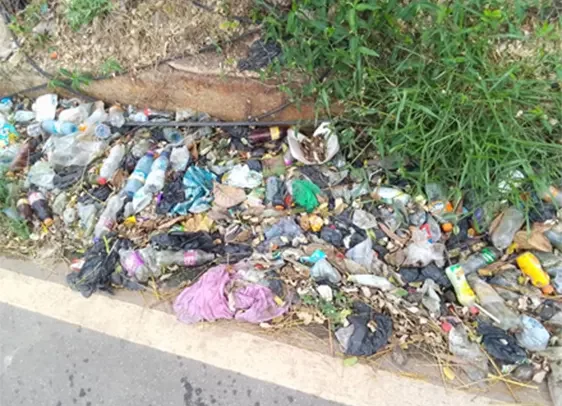One of the scenes in Osu
Growing piles of uncollected rubbish, choked gutters, and indiscriminate dumping of waste are fueling public health fears in Osu, one of Accra’s most vibrant neighbourhoods.
From Asafoaste Ankaa Street’s bustling commercial strip to the narrow residential lanes behind Ringway Estates, the stench of refuse and stagnant water is becoming part of daily life.
Residents say the worsening sanitation situation is already taking a toll on their well-being and warn it could spiral into a major health crisis if left unchecked as the raining season peaks.
“Every day I sweep in front of my shop, but people come and dump their rubbish again,” lamented Aunty Mabel, a shop owner near Ringway Estates. “We are just surrounded by filth, and the smell is terrible,” she added.
Like many others, she blames the poor state of waste management partly on irregular refuse collection by city authorities. “Sometimes, the bins are full for days. Who is supposed to collect them?” she asked.
A walk through parts of Osu paints a grim picture; gutters clogged with plastic and food waste, flies buzzing around open drains near food vendors, and pools of stagnant water breeding mosquitoes. The environmental conditions, health experts warn, are fertile ground for outbreaks of cholera, typhoid, and malaria. Although city by-laws prohibit littering and open dumping, enforcement remains weak.
Shared Responsibility
Some residents, however, acknowledge that the community itself bears part of the blame.
“Some of us are not helping at all,” admitted Mr. Godwin Tetteh, who has lived in Osu for over 20 years. “People dump ‘Borla’ behind their houses and leave it to rot. You can’t blame everything on the government.”
Mr. Tetteh recalls a time when “town council” officers patrolled neighbourhoods, inspecting premises and summoning offenders to court. He believes reviving such measures could improve the situation.
Calls for Action
Residents of Osu are now calling for urgent intervention from the Korle Klottey Municipal Assembly to step up waste management services, enforce sanitation laws, and educate the public on proper waste disposal.
Residents fear that blocked drains could worsen flooding in low-lying areas, spreading contaminants through homes and businesses.By
By Yussif Hawa


